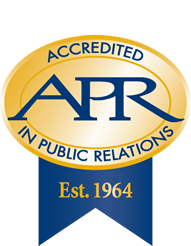Most of us don’t grow up dreaming of becoming a public relations practitioner. One way or another we find a path to our chosen profession and sometimes wonder how we arrived. My first recollection of public relations was hearing that one of my favorite baseball stars had retired to work in a “public relations” position for a casino. Of course in that context it meant he would be shaking hands and smiling in pictures with guests.
that one of my favorite baseball stars had retired to work in a “public relations” position for a casino. Of course in that context it meant he would be shaking hands and smiling in pictures with guests.
So after learning about the field in college, earning degrees in public relations and related areas, and working as a public relations director and college professor, why would I want an APR? Many of my friends in professional organizations convinced me that it was the next step in professional development. My personal opinion is that motivation for the APR can be categorized into four main areas:
- Knowledge gain and synthesis;
- Improved attitude and confidence;
- More marketability for you and your organization; and
- Enhancement of the profession.
Two major recommendations I’ve heard over the years are that the APR needs to be promoted more (additional PR for the APR) and that the computer-based Exam needs to be updated more often. Both of those concerns are being addressed now more than ever.
During the past year, the Universal Accreditation Board has made great strides in enhancing the APR, APR+M (military), and the Certificate in Principles of Public Relations. I’ve listed some highlights below:
- The computer-based Examination for Accreditation in Public Relations is updated on an ongoing basis. The Examination Work Group facilitated the successful 2016 relaunch of the computer-based Examination grounded in revised knowledge, skills and abilities (KSAs).
- The Preparation Work Group identified at least two references for each computer-based Exam question and revised and published the second edition of the “Study Guide for the Certificate in Principles of Public Relations Examination.”
- The Research Work Group conducted a practice analysis survey of 691 public relations practitioners (not just APRs) to assist the UAB in verifying the blueprint for the APR.
- The Marketing Communications Work Group is developing a nationwide campaign in conjunction with a consulting firm to promote the APR, APR+M, and Certificate in Principles of Public Relations programs to increase the number of participants and to build more awareness and understanding of the value.
- The APR+M Work Group continues to develop materials designed to increase awareness of the credential among military leaders, including drafting and coordinating a new Memorandum of Understanding between the Department of Defense and the UAB.
- The Certificate in Principles of Public Relations Work Group is focused on completing a video course for students preparing to take the Certificate in Principles of Public Relations examination.
- This Eligibility and Appeals/Policies and Procedures Work Group collaborated with all other groups to maintain consistency in policies for the board.
Last year I had the honor of chairing the UAB, and I was compelled to write a “year-in-review” letter because the board accomplished so much. That letter is now posted on the UAB website and being widely distributed to public relations professionals, and I hope you will read and share as well. For those in the public relations field, I encourage you to earn the APR. I also welcome the opportunity to talk about accreditation with anyone who cares about improving the profession of public relations. Thank you.
Dr. John E. Forde, APR, Fellow PRSA, served as chair of the UAB and has been a member of PRSA since 1989. Dr. Forde is committed to lifelong learning and has been teaching at Mississippi State University in the Department of Communication since 1987. Dr. Forde became head of the department on July 1, 2004, and continues to teach Principles of Public Relations, both in person and online. The Mississippi State University Department of Communication of 600 majors and 28 faculty includes concentrations in public relations, broadcasting, journalism, theatre, and communication studies.






